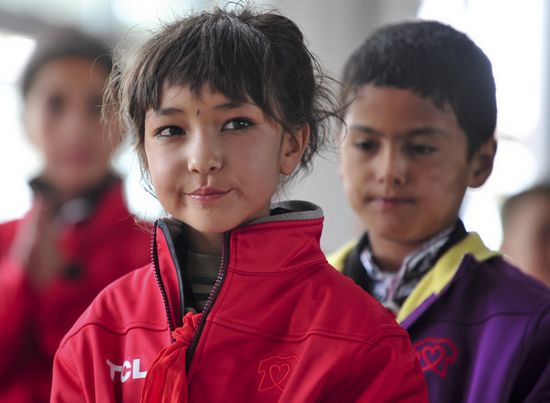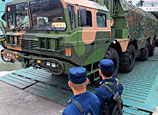
 |
| Students in Kashgar in the Xinjiang Uygur autonomous region wear new school uniforms provided by the China Youth Development Foundation. The foundation gave 4,363 uniforms to seven primary schools in Xinjiang as gifts for Children's Day in June. (Xinhua/Wang Fei) |
Increasing the senior high school admission rate in the Xinjiang Uygur autonomous region has been listed as a priority for the region's development during the next five years, regional authorities said during this year's local sessions.
Vocational education will become available for all junior and senior high school graduates from southern Xinjiang in the future, said Nur Bekri, chairman of the region.
Aniwar Abulim, director of the Kashgar prefecture education bureau, said on the sidelines of the first session of the 12th Xinjiang People's Congress, which concluded on Thursday: "The admission rate of senior high schools and vocational high schools in Kashgar prefecture is only about 54 percent at the moment. About 33,000 junior high students couldn't enter senior high schools every year."
"Young people who leave school early could be manipulated by separatists, extremists and terrorists who instigate them to carry out criminal acts," he said on Thursday.
The average admission rate at high schools and vocational high schools in the southern prefectures of Kashgar and Hotan, and Kezilesu Kirgiz autonomous prefecture increased to 60 percent in 2012 from just 26 percent in 2008.
Li Jianjun, Party chief of Hotan prefecture's Yutian county, said the high school admission rate in the county is less than 30 percent and his goal is to increase the rate to 40 percent in 2013.
Although the regional government in 2009 began to pay for the tuition fees for students from southern rural areas who go to vocational high schools, it is still a challenge to encourage them to continue their studies.
"Many students from less-developed southern Xinjiang are forced into labor markets because their families cannot afford for them to be in school. The parents want them to find jobs as early as possible so they can bring food to the table, so they leave school as soon as compulsory education ends after junior high school," said Patguli Jumar, a delegate from Hotan prefecture's Hotan county who is a primary school teacher.
But Li said that with more investments thrown into southern Xinjiang in the past two years, many parents began to realize the importance of skills.
"More well-paid job opportunities have become available but they all require certain skills. Many parents have changed their minds and decided to let their children be further educated. They now see it as an investment," he said.
Azhar Turson, vice-director of Xinjiang University of Finance and Economics, said the admission rate at senior high schools directly affects how many people can go to university. Southern Xinjiang desperately needs university graduates with higher skills for long-term development.
Patguli added that increasing the employment rate of university graduates is the key to boosting students' enthusiasm of study at all levels.
Young people who leave school early could become targets of separatists, extremists and terrorists, so increasing the admission rate of senior high schools in southern Xinjiang is crucial for improving the overall social stability of the region, a delegate of the 12th Xinjiang Regional People's Congress said.
The teacher from the primary school of Layka village said that although the students know that they need to obtain more skills for the future, poverty leaves them no choice.


















![]()
